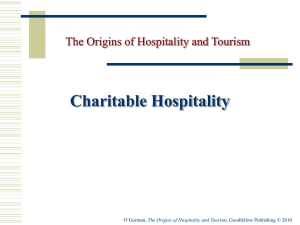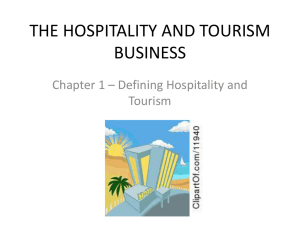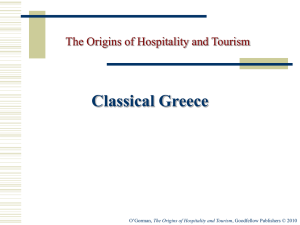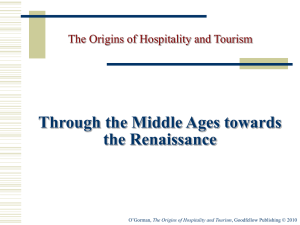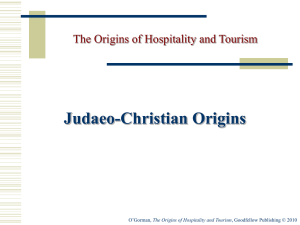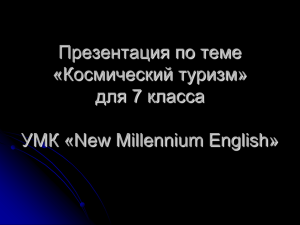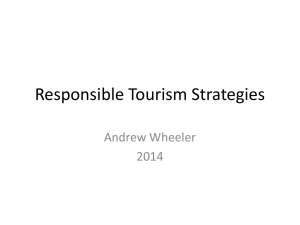The Origins of Hospitality and Tourism
advertisement
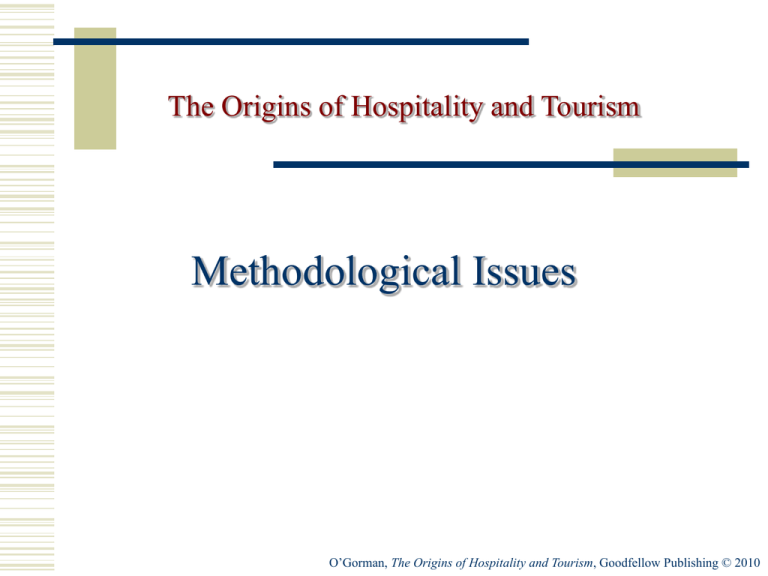
The Origins of Hospitality and Tourism Methodological Issues O’Gorman, The Origins of Hospitality and Tourism, Goodfellow Publishing © 2010 Developments in Research QUALITATIVE RESEARCH O’Gorman, The Origins of Hospitality and Tourism, Goodfellow Publishing © 2010 Introduction There is no single accepted way to doing qualitative research It depends on a range of factors including: Beliefs about the nature of the social world and what can be known about it (ontology) The nature of knowledge and how it can be acquired (epistemology) Purposes and goals of research Characteristics of the research participants Position and environment of the researchers themselves O’Gorman, The Origins of Hospitality and Tourism, Goodfellow Publishing © 2010 Key Elements of Qualitative Research • How do you know what is important to study? • Aims to provide an in-depth and interpreted understanding of the social world • Samples are small in scale and purposively selected • Data collection methods usually involve close interaction researcher/research participants • Data is detailed, information rich and extensive • Analysis is open to emergent concepts and ideas • Outputs tend to focus on the interpretation of social meaning through mapping and re-presenting the social world of research participants O’Gorman, The Origins of Hospitality and Tourism, Goodfellow Publishing © 2010 Developments in Archaeological Research Focus on material culture Late 20th Century Focus on ‘lifeways’ - how people lived and used places Physical Environment and technologies of past societies Archaeology Classical Archaeology 18th Century Shift from retrieval of artefacts to focus on people Spatial Socio-cultural Use of space and interrelationships of people and place Inter and intra-societal relationships, embodiment, behaviours and cosmologies O’Gorman, The Origins of Hospitality and Tourism, Goodfellow Publishing © 2010 Knowledge Tree - A way of scoping The Field Ontology What is the nature of reality? Epistemology What is the nature of knowledge? Methodology What is the nature of the approach to research? Techniques What practices of research should be undertaken? O’Gorman, The Origins of Hospitality and Tourism, Goodfellow Publishing © 2010 “Firstly ... nothing exists; secondly ... even if anything exists, it is incomprehensible by man; thirdly.., even if anything is comprehensible, it is guaranteed to be inexpressible and incommunicable to one’s neighbour” Gorgias (500BC) quoted in Aristotle (340BC) De Melisso Xenophane Gorgia 980 a19-20 O’Gorman, The Origins of Hospitality and Tourism, Goodfellow Publishing © 2010 Derived Hermeneutical Helix O’Gorman, The Origins of Hospitality and Tourism, Goodfellow Publishing © 2010 Three-Stage Iterative Research Process Stage 1 Examining the textual corpus as a whole, through exploring own presuppositions and pre-understandings of the text by developing personal reflectivity. This reflexive writing process is repeated at the two subsequent points where the helix returns to the pre-understanding and presuppositions stage, in order to reflect further on personal bias towards the texts. Stage 2 Review of the Judaeo-Christian theological and biblical studies literature to lay down background details before the inductive textual analysis was undertaken. In keeping with the traditional hermeneutic circle, after the pre-understandings and the textual corpus as a whole were reflected upon, the texts themselves were considered individually. Stage 3 Intergradations of the ideas and concepts into hospitality research. As a consequence of the application of the hermeneutical helix a new Hospitality Model is presented in three different contexts and from two perspectives (Chapter 10). O’Gorman, The Origins of Hospitality and Tourism, Goodfellow Publishing © 2010 Use of Language in Research RHETORICAL ISSUES O’Gorman, The Origins of Hospitality and Tourism, Goodfellow Publishing © 2010 How to translate “... translated texts tend to speak more of the translator than of their original message. It is not too difficult to render texts written in a dead language as literally as possible and to suggest to the outsider, through the use of quaint and stilted locutions, the alleged awkwardness and archaism of a remote period… A step nearer to the realization of the legitimate desire to make the texts ‘speak for themselves’… with a critical discussion of the literary, stylistic, and emotional setting of each translated piece” (Oppenheim 1977:3). O’Gorman, The Origins of Hospitality and Tourism, Goodfellow Publishing © 2010 Case Study on Romans 12:13 O’Gorman, The Origins of Hospitality and Tourism, Goodfellow Publishing © 2010 Translations of Romans 12:13 O’Gorman, The Origins of Hospitality and Tourism, Goodfellow Publishing © 2010 More Translations... O’Gorman, The Origins of Hospitality and Tourism, Goodfellow Publishing © 2010 Values and Reflexivity AXIOLOGICAL ISSUES O’Gorman, The Origins of Hospitality and Tourism, Goodfellow Publishing © 2010 Reflexivity “Modern societies have reached a position where not only are they forced to reflect on themselves but also they have the capability of reflecting back on themselves” Hall (2004:140) • Personal bias – influence on the research process • Personal bias – influence on the writing process These types of bias may exist within qualitative research – they must be controlled for where possible and at the very least acknowledged in your methodology O’Gorman, The Origins of Hospitality and Tourism, Goodfellow Publishing © 2010 Objects From a pre-Copernican view, objects are considered just by themselves, totally apart from any intrinsic cognitive relation to our representations; it is mysterious how they could ever be determined a priori. Kant theorised that things could be considered just as phenomena (objects of experience) rather than noumena (things in themselves specified negatively as unknown beyond our experience). Therefore, if human faculties of representation are used to study these phenomena, a priori conceptualisations can be envisaged. O’Gorman, The Origins of Hospitality and Tourism, Goodfellow Publishing © 2010 Objects Kant ([1781] 1998) also showed how flawless logic can prove the existence of God; at the same time he showed how flawless logic proves that there is no God at all; illustrating that opposing philosophies can be equally logical and at the same time contradictory and incomplete, a salient warning to any emergent researcher defending their philosophical stance. O’Gorman, The Origins of Hospitality and Tourism, Goodfellow Publishing © 2010 A warning… • Can everything come down to the beliefs of the researcher? • Is your opinion absolute? Benedict XVI (2005:2) “we are building a dictatorship of relativism that does not recognize anything as definitive and whose ultimate goal consists solely of one’s own ego and desires.” O’Gorman, The Origins of Hospitality and Tourism, Goodfellow Publishing © 2010

